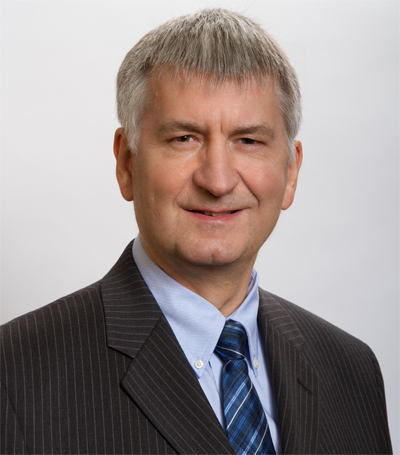
Dr. Erwin Oechslin, Director, Adult Congenital Heart Disease Program at PMCC, and Bitove Family Professor of Adult Congenital Heart Disease. (Photo: Peter Munk Cardiac Centre)
Many of the world's leading medical minds focused on improving and extending the lives of patients born with a heart defect will convene in Toronto this week, when the Peter Munk Cardiac Centre hosts the 25th Annual International Symposium on Adult Congenital Heart Disease (ACHD).
Finding solutions for an increasingly complex patient population
In conjunction with Oregon Health & Science University, Cincinnati Children's Hospital Medical Centre, University of Cincinnati and the University of Toronto, several hundred participants will share knowledge, experience, key learnings and strive to find solutions to an increasingly complex patient population --- those men and women who were born with a serious heart condition and because of medical advances over the past 50 years, are now surviving childhood and living on into adult life.
The bustling adult congenital heart disease clinics at the Peter Munk Cardiac Centre see close to 4,000 patients per year, with more than 200 hundred new patients 'graduating' each year to PMCC from SickKids, where they spend the first 18 years of their lives being closely monitored and supervised via regular visits and following life-saving operations.
Another 500 patients are referred from the community each year; some of them have been lost to follow-up for many years. Sometimes, an acute deterioration of a long-term complication forces them to go to the emergency room and brings them back to the health care system – a scenario, which could potentially be avoided, had there been no lapse in expert care.
Related to this story:
'We cannot stop looking'
"We are part of one of modern medicine's truly remarkable success stories," says Dr. Erwin Oechslin, Director, Adult Congenital Heart Disease Program at PMCC, and Bitove Family Professor of Adult Congenital Heart Disease.
"Some 95 per cent of children with congenital heart disease now reach adulthood. This number was about 20 per cent in the 1950's. Such amazing advances fuel us," he says.
"If we don't continue seeking solutions, we are leaving these adults in the lurch," says Dr. Lucy Roche, Adult Congenital Cardiologist at the Peter Munk Cardiac Centre, whose training included five years in pediatric cardiology.
"We would let down not just the patients" she says, "but also the tremendous efforts of previous generations who found surgical answers to what at the time, must have seemed insurmountable problems for infants born with congenital heart disease. We cannot stop looking."
This year's focus at the Symposium
One area of particular focus during this year's Symposium will be heart failure, transplant, and artificial mechanical heart devices in adults with congenital heart disease. The first day of the symposium is dedicated to these topics.
"The fact is, many of our most complex ACHD patients are beginning to develop heart failure and most of these relatively young patients will get less benefit from drug heart failure therapy than usually expected," says Dr. Roche.
"At the moment heart transplantation and/or mechanical support may be their only option," she says.
Scarcity of donor organs
Unfortunately, the scarcity of donor organs and the complexity of further surgery in such patients means that the risks of offering advanced heart failure support can be high. Historically, ACHD patients have made up only a tiny proportion of those receiving such treatments.
On the other hand, when things go well, the results can be impressive and life-changing. For example, the overall average length of survival for congenital heart disease patients who undergo heart transplant is longer than those seen in other patient groups.
"We need to find ways of reducing the need for heart transplantation and mechanical support in this population when necessary, to make advanced heart failure management safer, more successful and more universally accessible," says Dr. Roche.
"It will be a good moment here in Toronto, (during this Symposium) to engage with international experts and colleagues all focused on finding solutions that improve our patient's lives."
The 25th International Symposium on Adult Congenital Heart Disease will take place June 3-6, 2015 in Toronto.
